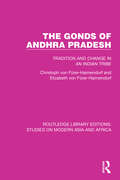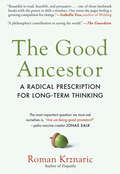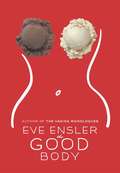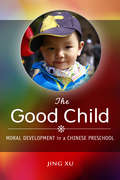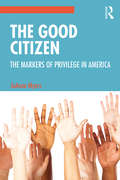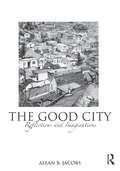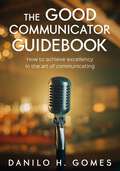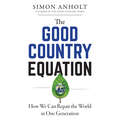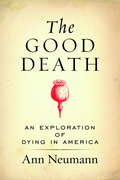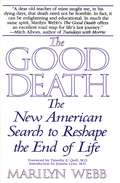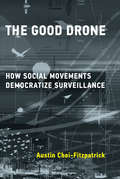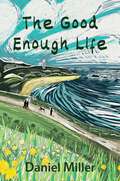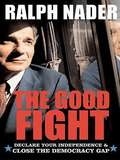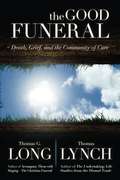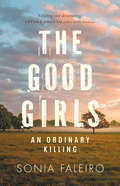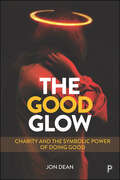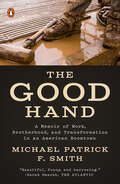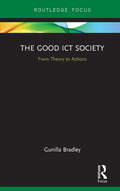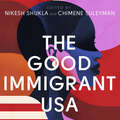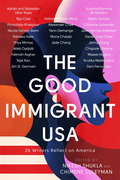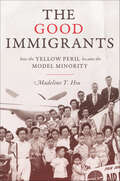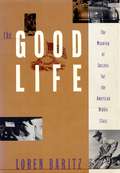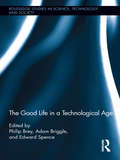- Table View
- List View
The Gonds of Andhra Pradesh: Tradition and Change in an Indian Tribe (Studies on Modern Asia and Africa)
by Christoph von Fürer-Haimendorf Elizabeth von Fürer-HaimendorfAmong the tribal populations of India there is none which rivals in numerical strength and historical importance the group of tribes known as Gonds. In the late 1970s, numbering well over four million, Gonds extend over a large part of the Deccan and constitute a prominent element in the complex ethnic pattern of the zone where Dravidian and Indo-Aryan populations overlap and dovetail. In the highlands of the former Hyderabad State (now Andhra Pradesh) concentrations of Gonds persisted in their traditional lifestyle until the middle of the twentieth century: feudal chiefs continued to function as tribal heads and hereditary bards preserved a wealth of myths and epic tales. It was at that time that Christoph von Fürer-Haimendorf first began his study of this group of Gonds, spending the better part of three years in their villages. While observing their daily life and their elaborate ritual performances, he also saw the threat which more advanced Hindu populations, infiltrating into the Gonds’ habitat and competing for their ancestral land, were posing to their way of life. During the thirty years prior to publication the author had frequently revisited the Gond region and in 1976-7 he undertook a detailed re-study of social and economic developments in the villages he knew best. His long-standing familiarity with many individual Gonds has allowed him to draw in this book, originally published in 1979, an intimate picture of the life of a specific village community and to trace the fates of individual men and women over a long stretch of time. While his earlier book The Raj Gonds of Adilabad: Myth and Ritual concentrated mainly on the Gonds’ mythology and ritual practices, the present volume devotes more space to a detailed analysis of the operation of social forces and the traditional structure of a society characterised by a high degree of cohesion. In 1979 the Gonds were once again being subjected to the pressure of outside forces and Professor von Fürer-Haimendorf lays special emphasis on the analysis of the process of social change forced upon the Gonds by settlers from outside. The last part of the book thus represents a case history of the transformation of a tribal society under the impact of modernisation and relentless population growth.
The Good Ancestor: A Radical Prescription For Long-term Thinking
by Roman KrznaricFrom leading philosopher Roman Krznaric, an urgent call to save ourselves and our planet by getting to the root of the current crisis—society’s extreme short-sightedness As heard on NPR’s TED Radio Hour When Jonas Salk developed the polio vaccine, he refused to patent it—forgoing profit so that more lives could be saved. His radical generosity to future generations should inspire us, but leading philosopher Roman Krznaric sees the opposite happening: Our short-term, exploitative mindsets have “colonized the future,” leaving an inexcusable chasm between the haves and have-nots—and mounting existential threats—that have brought our species to the precipice of disaster. Yet Krznaric sees reason to hope. The urgent struggle for intergenerational justice calls for hugely ambitious solutions, from rewiring our growth-at-all-costs economy to giving voters of future generations a voice in our democracies. But at the heart of all these changes is one we can enact within ourselves: We must trade shortsightedness for long-term thinking. In The Good Ancestor, Krznaric reveals six practical ways we can retrain our brains to think of the long view and to shift our allegiance from this generation to all humanity—to save our planet and our future.
The Good Body
by Eve EnslerBotox, bulimia, breast implants, stomach tucks - Eve Ensler is back, with another round of poignant and hilarious stories about the secret lives of women. Here are our intimate obsessions laid bare - who hasn't hungered for shapelier thighs, a nip or tuck or just a little piercing? Ensler toured the world asking women about their anatomical obsessions and gives us their stories: a Puerto Rican's ruminations on fat and family, an Indian beauty's obsession with hair, an LA woman's ultimate concession to h...
The Good Child: Moral Development in a Chinese Preschool
by Jing XuChinese academic traditions take zuo ren—self-fulfillment in terms of moral cultivation—as the ultimate goal of education. To many in contemporary China, however, the nation seems gripped by moral decay, the result of rapid and profound social change over the course of the twentieth century. Placing Chinese children, alternately seen as China's greatest hope and derided as self-centered "little emperors," at the center of her analysis, Jing Xu investigates the effects of these transformations on the moral development of the nation's youngest generation.The Good Child examines preschool-aged children in Shanghai, tracing how Chinese socialization beliefs and methods influence their construction of a moral world. Delving into the growing pains of an increasingly competitive and changing educational environment, Xu documents the confusion, struggles, and anxieties of today's parents, educators, and grandparents, as well as the striking creativity of their children in shaping their own moral practices. Her innovative blend of anthropology and psychology reveals the interplay of their dialogues and debates, illuminating how young children's nascent moral dispositions are selected, expressed or repressed, and modulated in daily experiences.
The Good Citizen: The Markers of Privilege in America
by JoAnne MyersUsing applied political theory, JoAnne Myers presents five markers by which citizens become second-class citizens—property, productivity, participation, patriotism, and reproduction. Citizenship is a highly contested status since it grants members political rights and responsibilities. It is contextualized by cultural, political, historical, economic, situational, and place. In the United States, we think of citizenship in principle as democratic, but citizenship is not just a binary status: norms, policies, and laws can mark some citizens as “other.” In The Good Citizen: The Markers of Privilege in America, Myers argues that being marked as not having or achieving these markers is how citizenship is controlled and regulated. To illustrate this argument, each chapter begins with a practical question or myth to ease the reader into the marker being examined. She later articulates the ways in which law and norms and biopower regulates and controls citizens in three policy areas. Myers moves beyond theories of citizen marginalization based on identity politics and intersectionality to provide a new understanding of citizenship practice. The Good Citizen will be of interest to scholars and researchers of politics, sociology, or legal studies of citizenship, and anyone concerned with distributive justice.
The Good City: Reflections and Imaginations
by Allan B. JacobsCities, Allan B. Jacobs contends, ought to be magnificent, beautiful places to live. They should be places where people can be fulfilled, where they can be what they can be, where there is freedom, love, ideas, excitement, quiet and joy. Cities ought to be the ultimate manifestation of society’s collective achievements. Allan B. Jacobs is one of the world’s best known planners and urban design practitioners, with a long and distinguished international career. Drawing on his professional experience of almost sixty years, Jacobs guides the reader through the lessons he’s learnt as a planner and lover of cities. Cities from Brazil, Italy, India, Japan, China and the US are featured. Written with a wonderfully engaging, humorous tone and Jacobs’ own drawings, The Good City transfers lessons on city design, building and urban change to all those willing to help cities become the magnificent, beautiful places they should be - and encourages all inhabitants to learn to appreciate and explore their own cities.
The Good Communicator Guidebook: How to achieve excellency in the art of communicating
by Danilo H. GomesA book that aims to instruct those who want to improve their communication techniques. The good communicator manual Do not know how to communicate well? Want to improve your ability to persuade and your verbal skills? Find what you need in this work. The human race is the only one of the other creatures present on planet Earth that is able to communicate through verbal language. Even though it is a skill present in humans, most of them have great difficulty in expressing themselves satisfactorily. The power of words is immeasurable, especially if used correctly. Speed, gestures, breathing, assembling sentences, everything counts when it comes to communication. A good communicator achieves high goals using only his or her language-related abilities. This book will help you evolve effectively in your verbal and non-verbal communication powers. By acquiring this work, you will have access to subjects such as: - Self analysis - Persuasion - How to use words correctly - Identification of common communication errors - Objectivity and effectiveness through speaking "How to Improve Vocabulary" - Communication in the relationship - Techniques to improve non-verbal communication - Communication in appearance And much more! Transform your way of communicating and achieve your goals more easily!
The Good Country Equation: How We Can Repair the World in One Generation
by Simon AnholtWhy doesn't the world work? Why, despite all the power, technology, money and knowledge that humanity has accumulated, are we are still unable to defeat global challenges like climate change, war, poverty, migration, extremism, and inequality? Simon Anholt has spent decades helping countries from Austria to Zambia to improve their international standing. Using colorful descriptions of his experiences--dining with Vladimir Putin at his country home, taking a group of Felipe Calderon's advisors on their first Mexico City subway ride, touring a beautiful new government hospital in Afghanistan that nobody would use because it was in Taliban-controlled territory--he tells how he began finding answers to that question. Ultimately, Anholt hit on the Good Country Equation, a formula for encouraging international cooperation and reinventing education for a globalized era. Anholt even offers a "selfish" argument for cooperation: he shows that it generates goodwill, which in turn translates into increased trade, foreign investment, tourism, talent attraction, and even domestic electoral success. Anholt insists we can change the way countries behave and the way people are educated in a single generation--because that's all the time we have.
The Good Death
by Ann NeumannFollowing the death of her father, journalist and hospice volunteer Ann Neumann sets out to examine what it means to die well in the United States.When Ann Neumann's father was diagnosed with non-Hodgkin's lymphoma, she left her job and moved back to her hometown of Lancaster, Pennsylvania. She became his full-time caregiver--cooking, cleaning, and administering medications. When her father died, she was undone by the experience, by grief and the visceral quality of dying. Neumann struggled to put her life back in order and found herself haunted by a question: Was her father's death a good death?The way we talk about dying and the way we actually die are two very different things, she discovered, and many of us are shielded from what death actually looks like. To gain a better understanding, Neumann became a hospice volunteer and set out to discover what a good death is today. She attended conferences, academic lectures, and grief sessions in church basements. She went to Montana to talk with the attorney who successfully argued for the legalization of aid in dying, and to Scranton, Pennsylvania, to listen to "pro-life" groups who believe the removal of feeding tubes from some patients is tantamount to murder. Above all, she listened to the stories of those who were close to death.What Neumann found is that death in contemporary America is much more complicated than we think. Medical technologies and increased life expectancies have changed the very definition of medical death. And although death is our common fate, it is also a divisive issue that we all experience differently. What constitutes a good death is unique to each of us, depending on our age, race, economic status, culture, and beliefs. What's more, differing concepts of choice, autonomy, and consent make death a contested landscape, governed by social, medical, legal, and religious systems.In these pages, Neumann brings us intimate portraits of the nurses, patients, bishops, bioethicists, and activists who are shaping the way we die. The Good Death presents a fearless examination of how we approach death, and how those of us close to dying loved ones live in death's wake.From the Hardcover edition.
The Good Death: The New American Search to Reshape the End of Life
by Marilyn WebbThe Good Death is the first full-scale examination of one of today's most complex issues: the profound change in the way Americans think about and confront death. Drawing on more than six years of firsthand research and reporting, noted journalist Marilyn Webb builds her account around intimate portraits of the dying themselves. She explains why some deaths become shockingly difficult--and needlessly painful--and how the struggles over end-of-life decisions can pit patient and family against hospitals, doctors, insurance companies, religious groups, and the law.But there is good news as well. Webb describes many extraordinary programs and individuals who are changing the face of dying. An abundant source of comfort and hope, The Good Death shows how the essential elements of humane--even uplifted--death are available to all of us, if we know what is possible, where to go for help, and how to prepare.From the Trade Paperback edition.
The Good Doctors: The Medical Committee for Human Rights and the Struggle for Social Justice in Health Care
by John DittmerIn the summer of 1964 medical professionals, mostly white and northern, organized the Medical Committee for Human Rights (MCHR) to provide care and support for civil rights activists organizing black voters in Mississippi. They left their lives and lucrative private practices to march beside and tend the wounds of demonstrators from Freedom Summer, the March on Selma, and the Chicago Democratic Convention of 1968. Galvanized and sometimes radicalized by their firsthand view of disenfranchised communities, the MCHR soon expanded its mission to encompass a range of causes from poverty to the war in Vietnam. They later took on the whole of the United States healthcare system. MCHR doctors soon realized fighting segregation would mean not just caring for white volunteers, but also exposing and correcting shocking inequalities in segregated health care. They pioneered community health plans and brought medical care to underserved or unserved areas. Though education was the most famous battleground for integration, the appalling injustice of segregated health care levelled equally devastating consequences. Award-winning historian John Dittmer, author of the classic civil rights history Local People: The Struggle for Civil Rights in Mississippi, has written an insightful and moving account of a group of idealists who put their careers in the service of the motto “Health Care Is a Human Right.”
The Good Drone: How Social Movements Democratize Surveillance (Acting with Technology)
by Austin Choi-FitzpatrickHow small-scale drones, satellites, kites, and balloons are used by social movements for the greater good.Drones are famous for doing bad things: weaponized, they implement remote-control war; used for surveillance, they threaten civil liberties and violate privacy. In The Good Drone, Austin Choi-Fitzpatrick examines a different range of uses: the deployment of drones for the greater good. Choi-Fitzpatrick analyzes the way small-scale drones--as well as satellites, kites, and balloons--are used for a great many things, including documenting human rights abuses, estimating demonstration crowd size, supporting anti-poaching advocacy, and advancing climate change research. In fact, he finds, small drones are used disproportionately for good; nonviolent prosocial uses predominate.
The Good Enough Life
by Daniel MillerThis book is a highly original exploration of what life could and should be. It juxtaposes a philosophical enquiry into the nature of the good life with an ethnography of people living in a small Irish town. Attending carefully to the everyday lives of these people, the ethnographic chapters examine topics ranging from freedom and inequality to the creation of community and the purpose of life. These chapters alternate with discussions of similar topics by a wide range of philosophers in the Western tradition, from Socrates and the Stoics through Kant, Hegel and Heidegger to Adorno, Rawls, MacIntyre and Nussbaum.As an ethnography, this is a book of praise that reveals just how much we can learn from a respectful acknowledgment of what ordinary modest people have achieved. By creating community as a deliberate and social project that provides the foundation for a more fulfilling life, where affluence has not led to an increase in individualism, the people in this town have found a way to live the good enough life. The book also shows how anthropology and philosophy can complement and enrich one another in an inquiry into what we might accomplish in our lives.
The Good Fight: Declare Your Independence & Close the Democracy Gap
by Ralph NaderReflections of a political independent who has staged two runs for president. Naderwrites about corporate government, civic motivation, campaigning, civil liberties, trial, the multiple party system, and more.
The Good Funeral
by Thomas Lynch Thomas G. LongTwo of the most authoritative voices on the funeral industry come together here in one volume to discuss the current state of the funeral. Through their different lenses--one as a preacher and one as a funeral director--Thomas G. Long and Thomas Lynch alternately discuss several challenges facing "the good funeral," including the commercial aspects that have led many to be suspicious of funeral directors, the sometimes tense relationship between pastors and funeral directors, the tendency of modern funerals to exclude the body from the service, and the rapid growth in cremation. The book features forewords from Patrick Lynch, President of the National Funeral Directors Association, and Barbara Brown Taylor, highly praised author and preacher. It is an essential resource for funeral directors, morticians, and pastors, and anyone else interested in current funeral practices.
The Good Girls: An Ordinary Killing
by Sonia FaleiroA shattering, utterly immersive work of investigative journalism, The Good Girls slips behind political maneuvering, caste systems and codes of honour in a village in northern India to tell the real story behind the tragic deaths of two teenage girls and an epidemic of violence against women.In the early dawn one day in 2014, a man discovered the dead bodies of 14-year-old Lalli Shakya and 16-year-old Padma Shakya hanging from a mango tree on the edge of their village in Uttar Pradesh. When the inseparable cousins hadn't returned from a walk to the fields to relieve themselves the evening before, their families had begun searching for them. Upon hearing of the discovery and reaching the bodies, the grief-stricken women of the family formed a protective shield around the tree. They knew that if their girls were taken down immediately, they would be forgotten, lost in a brutally inefficient and prejudiced system; but if media arrived, and photos of the bodies went viral, those in power could not ignore the deaths and justice would be served. Dramatic images of the Shakya girls spread across India and the world, inciting horror and despair. Padma and Lalli died two years after the Delhi bus rape, and many saw the cousins as victims of an ongoing epidemic of violence, one that was emerging in rural villages. The reality that Sonia Faleiro deftly illuminates,wrapped in pressures of caste, gender, technology and teenage desire, proves to be more complicated, and just as devastating. Intimate, mesmerizing, based on years of meticulous reportage, The Good Girls uncovers the heartbreaking truth of what happened that night through the voices of the girls' families, those who saw them last and the legal and medical officials who touched the case.
The Good Glow: Charity and the Symbolic Power of Doing Good
by Jon DeanWe praise those people who do things for others. But the symbolic power of giving means individuals can take advantage of the glow of 'goodness' that charity provides. This book analyses the reality of how charity operates in the social world; how the personal benefits of giving and volunteering are vital for getting charitable acts to happen; how the altruism associated with gifts isn't always what it seems; how charity misbehaviour or bad management gets overlooked; and how charity symbols are weaponised against those who don't participate. Drawing on original data and a novel application of the sociology of Bourdieu, this book examines a wide range of examples from culture, politics and society to provide an entertaining critique of how contemporary charity works.
The Good Hand: A Memoir of Work, Brotherhood, and Transformation in an American Boomtown
by Michael Patrick Smith"Remarkable . . . this is the book that Hillbilly Elegy should have been." --Kirkus ReviewsA vivid window into the world of working class men set during the Bakken fracking boom in North DakotaLike thousands of restless men left unmoored in the wake of the 2008 economic crash, Michael Patrick Smith arrived in the fracking boomtown of Williston, North Dakota five years later homeless, unemployed, and desperate for a job. Renting a mattress on a dirty flophouse floor, he slept boot to beard with migrant men who came from all across America and as far away as Jamaica, Africa and the Philippines. They ate together, drank together, argued like crows and searched for jobs they couldn't get back home. Smith's goal was to find the hardest work he could do--to find out if he could do it. He hired on in the oil patch where he toiled fourteen hour shifts from summer's 100 degree dog days to deep into winter's bracing whiteouts, all the while wrestling with the demons of a turbulent past, his broken relationships with women, and the haunted memories of a family riven by violence.The Good Hand is a saga of fear, danger, exhaustion, suffering, loneliness, and grit that explores the struggles of America's marginalized boomtown workers--the rough-hewn, castoff, seemingly disposable men who do an indispensable job that few would exalt: oil field hands who, in the age of climate change, put the gas in our tanks and the food in our homes. Smith, who had pursued theater and played guitar in New York, observes this world with a critical eye; yet he comes to love his coworkers, forming close bonds with Huck, a goofy giant of a young man whose lead foot and quick fists get him into trouble with the law, and The Wildebeest, a foul-mouthed, dip-spitting truck driver who torments him but also trains him up, and helps Smith "make a hand."The Good Hand is ultimately a book about transformation--a classic American story of one man's attempt to burn himself clean through hard work, to reconcile himself to himself, to find community, and to become whole.
The Good Holiday: Development, Tourism and the Politics of Benevolence in Mozambique
by João Afonso BaptistaDrawing on ethnographic research in the village of Canhane, which is host to the first community tourism project in Mozambique, The Good Holiday explores the confluence of two powerful industries: tourism and development, and explains when, how and why tourism becomes development and development, tourism. The volume further explores the social and material consequences of this merging, presenting the confluence of tourism and development as a major vehicle for the exercise of ethics, and non-state governance in contemporary life.
The Good ICT Society: From Theory to Actions (Routledge Research in Information Technology and Society)
by Gunilla BradleyWhat is Quality of Life in a society that has embraced information and communication technology (ICT)? What is Wisdom in this kind of society? And what things are helping or hindering us from having both wisdom and a good quality of life in ICT societies? #65533; Taking the reader through a quick analysis of the current social and psychological changes in the Information and Communication Society, Bradley challenges us to avoid becoming victims of technology - whether we are professionals, policymakers, parents or citizens. Indeed, she introduces a theoretical model based on four decades#65533; worth of research to help the reader to understand this complex, technological world. In addition to focusing the reader#65533;s attention on convergence and acceleration, this model describes the interplay between technology, societal structure, organizational design and human roles, thus leading to what Bradley describes as a "good ICT society". #65533; Emphasising the necessity of a co-operative parallel between the automation and humanization of society, this innovative volume will be of interest to undergraduate and postgraduate students and postdoctoral researchers interested in the subjects such as Information and Communication Technology and Social Change, Psychology and Sociology, Computer Technology and Media Technology.
The Good Immigrant USA: 26 Writers Reflect on America
by Nikesh Shukla Chimene SuleymanGUARDIAN MUST READ BOOKS OF 2019 'The you-gotta-read-this anthology' Stylist'This collection showcases the joy, empathy and fierceness needed to adopt the country as one's own' Publishers Weekly An urgent collection of essays by first- and second-generation immigrants, exploring what it's like to be othered in an increasingly divided America. From Trump's proposed border wall and travel ban to the marching of White Supremacists in Charlottesville, America is consumed by tensions over immigration and the question of which bodies are welcome. In this much-anticipated follow-up to the bestselling UK edition, hailed by Zadie Smith as 'lively and vital', editors Nikesh Shukla and Chimene Suleyman hand the microphone to an incredible range of writers whose humanity and right to be in the US is under attack. Chigozie Obioma unpacks an Igbo proverb that helped him navigate his journey to America from Nigeria. Jenny Zhang analyzes cultural appropriation in nineties fashion, recalling her own pain and confusion as a teenager trying to fit in. Fatimah Asghar describes the flood of memory and emotion triggered by an encounter with an Uber driver from Kashmir. Alexander Chee writes of a visit to Korea that changed his relationship to his heritage. These writers, and the many others in this singular collection, share powerful personal stories of living between cultures and languages while struggling to figure out who they are and where they belong. By turns heartbreaking and hilarious, troubling and uplifting, the essays in The Good Immigrant USA come together to create a provocative, conversation-sparking, multi-vocal portrait of America now.Essays from:Porochista Khakpour; Nicole Dennis-Benn; Rahawa Haile; Teju Cole; Priya Minhas; Walé Oyéjidé; Fatimah Asghar; Tejal Rao; Maeve Higgins; Krutika Mallikarjuna; Jim St. Germain; Jenny Zhang; Chigozie Obioma; Alexander Chee; Yann Demange; Jean Hannah Edelstein; Chimene Suleyman; Basim Usmani; Daniel José Older; Adrián Villar Rojas; Sebastián Villar Rojas; Dani Fernandez; Fatima Farheen Mirza; Susanne Ramírez de Arellano; Mona Chalabi; Jade Chang
The Good Immigrant USA: 26 Writers on America, Immigration and Home
by Nikesh Shukla Chimene SuleymanGUARDIAN MUST READ BOOKS OF 2019 'The you-gotta-read-this anthology' Stylist'This collection showcases the joy, empathy and fierceness needed to adopt the country as one's own' Publishers Weekly An urgent collection of essays exploring what it's like to be othered in an increasingly divided America. From Trump's proposed border wall and travel ban to the marching of White Supremacists in Charlottesville, America is consumed by tensions over immigration and the question of which bodies are welcome. In this much-anticipated follow-up to the bestselling UK edition, hailed by Zadie Smith as 'lively and vital', editors Nikesh Shukla and Chimene Suleyman hand the microphone to an incredible range of writers whose humanity and right to be in the US is under attack. By turns heartbreaking and hilarious, troubling and uplifting, the essays in The Good Immigrant USA come together to create a provocative, conversation-sparking, multi-vocal portrait of America now.Essays from:Porochista Khakpour; Nicole Dennis-Benn; Rahawa Haile; Teju Cole; Priya Minhas; Walé Oyéjidé; Fatimah Asghar; Tejal Rao; Maeve Higgins; Krutika Mallikarjuna; Jim St. Germain; Jenny Zhang; Chigozie Obioma; Alexander Chee; Yann Demange; Jean Hannah Edelstein; Chimene Suleyman; Basim Usmani; Daniel José Older; Adrián Villar Rojas; Sebastián Villar Rojas; Dani Fernandez; Fatima Farheen Mirza; Susanne Ramírez de Arellano; Mona Chalabi; Jade Chang
The Good Immigrants: How the Yellow Peril Became the Model Minority (Politics and Society in Modern America)
by Madeline Y. HsuConventionally, US immigration history has been understood through the lens of restriction and those who have been barred from getting in. In contrast, The Good Immigrants considers immigration from the perspective of Chinese elites—intellectuals, businessmen, and students—who gained entrance because of immigration exemptions. Exploring a century of Chinese migrations, Madeline Hsu looks at how the model minority characteristics of many Asian Americans resulted from US policies that screened for those with the highest credentials in the most employable fields, enhancing American economic competitiveness.The earliest US immigration restrictions targeted Chinese people but exempted students as well as individuals who might extend America's influence in China. Western-educated Chinese such as Madame Chiang Kai-shek became symbols of the US impact on China, even as they patriotically advocated for China's modernization. World War II and the rise of communism transformed Chinese students abroad into refugees, and the Cold War magnified the importance of their talent and training. As a result, Congress legislated piecemeal legal measures to enable Chinese of good standing with professional skills to become citizens. Pressures mounted to reform American discriminatory immigration laws, culminating with the 1965 Immigration Act.Filled with narratives featuring such renowned Chinese immigrants as I. M. Pei, The Good Immigrants examines the shifts in immigration laws and perceptions of cultural traits that enabled Asians to remain in the United States as exemplary, productive Americans.
The Good Life
by Loren BaritzWhat is the American middle class? What does it want? In search of these answers The Good Life tackles the assumptions Americans make and have made about their own culture--about the meaning of equality, success, personal and national security, acceptable ways of dressing and loving and raising children, and, most important, individual freedom. Loren Baritz, a noted observer of American society, leads us to discover not only what Americans are after, but what they usually get in the end. Revealing the realities, the illusions, and the myths of the American middle class, The Good Life makes an exceptional contribution to the understanding of the American way of life. Its broad, incisive, scholarly commentary is sure to arouse controversy and debate.
The Good Life in a Technological Age (Routledge Studies in Science, Technology and Society)
by Adam Briggle Philip Brey Edward SpenceModern technology has changed the way we live, work, play, communicate, fight, love, and die. Yet few works have systematically explored these changes in light of their implications for individual and social welfare. How can we conceptualize and evaluate the influence of technology on human well-being? Bringing together scholars from a cross-section of disciplines, this volume combines an empirical investigation of technology and its social, psychological, and political effects, and a philosophical analysis and evaluation of the implications of such effects.
